See Page 1 |
2 | of the November 2024 homepage
archives. Thursday the 14th
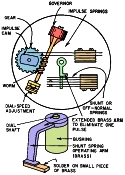 Here is the second part of a series of articles
about
stepping switches appearing in 1967 issues of Radio-Electronics magazine.
A standard (at the time) dial rotary phone was used as a familiar example in the
part one. It delivers a single pulse for each number / letter set from 1, 2 (ABC),
3 (DEF), through 9 (WXY), 0 (Operator). On some phones, you can hear the clacking
of the switch contacts as the spring-loaded dial rotates from the selected number
back to home position. The stepping action as the result of dialing occurs at the
telephone system switching and call routing equipment at central locations. There,
stepping switches increment with each pulse received, and when the full number of
pulse sets have arrived, the circuit is complete and the call put through to ring
the phone... Here is the second part of a series of articles
about
stepping switches appearing in 1967 issues of Radio-Electronics magazine.
A standard (at the time) dial rotary phone was used as a familiar example in the
part one. It delivers a single pulse for each number / letter set from 1, 2 (ABC),
3 (DEF), through 9 (WXY), 0 (Operator). On some phones, you can hear the clacking
of the switch contacts as the spring-loaded dial rotates from the selected number
back to home position. The stepping action as the result of dialing occurs at the
telephone system switching and call routing equipment at central locations. There,
stepping switches increment with each pulse received, and when the full number of
pulse sets have arrived, the circuit is complete and the call put through to ring
the phone...
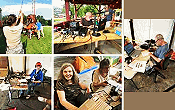 "Results
are published, and the numbers are in. They paint a picture of a very active
2024 ARRL
Field Day. Nearly 1.3 million contacts were reported during the 24-hour event.
That is up from 2023's 1.25 million contacts. That's likely indicative of the continued
rise of Solar Cycle 25 leading up to the event, but more people also participated
this year. Entries were received from all 85 ARRL and Radio Amateurs of Canada (RAC)
sections, as well as from 27 different countries from outside the US and Canada.
'It is encouraging to see a rise in participation year to year,' said ARRL Contest
Program Manager Paul Bourque, N1SFE. 'ARRL Field Day is amateur radio's premier
event, and the hams turned out for it..." "Results
are published, and the numbers are in. They paint a picture of a very active
2024 ARRL
Field Day. Nearly 1.3 million contacts were reported during the 24-hour event.
That is up from 2023's 1.25 million contacts. That's likely indicative of the continued
rise of Solar Cycle 25 leading up to the event, but more people also participated
this year. Entries were received from all 85 ARRL and Radio Amateurs of Canada (RAC)
sections, as well as from 27 different countries from outside the US and Canada.
'It is encouraging to see a rise in participation year to year,' said ARRL Contest
Program Manager Paul Bourque, N1SFE. 'ARRL Field Day is amateur radio's premier
event, and the hams turned out for it..."
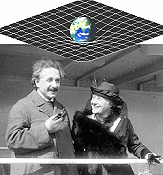 After searching for the first mention of
Nikola Tesla in U.S. newspapers, I performed a similar search on
Albert Einstein, again using editions available in the NewspaperArchive.com
database. I was utterly surprised to find it in a 1919 issue of the The New
York Times. His theory of Special Relativity was published in 1905 and his
theory of General Relativity was published in 1915, so it took The NY Times
four years to mention it. There is a reference to Dr. Einstein's' work on relativity
in a 1915 edition of The Manitoban, from Winnipeg, Canada. The NY Times
article is an actual interview with Albert Einstein, wherein at one point it is
stated that there were perhaps only a dozen people in the world at that time who
understood general relativity. Interestingly, Einstein uses the term "difform motion"
to describe... After searching for the first mention of
Nikola Tesla in U.S. newspapers, I performed a similar search on
Albert Einstein, again using editions available in the NewspaperArchive.com
database. I was utterly surprised to find it in a 1919 issue of the The New
York Times. His theory of Special Relativity was published in 1905 and his
theory of General Relativity was published in 1915, so it took The NY Times
four years to mention it. There is a reference to Dr. Einstein's' work on relativity
in a 1915 edition of The Manitoban, from Winnipeg, Canada. The NY Times
article is an actual interview with Albert Einstein, wherein at one point it is
stated that there were perhaps only a dozen people in the world at that time who
understood general relativity. Interestingly, Einstein uses the term "difform motion"
to describe...
 Exodus Advanced Communications, is a multinational
RF communication equipment and engineering service company serving both commercial
and government entities and their affiliates worldwide. We are pleased to announce
the model
AMP2103P-LC, dual-mode (CW & pulse) amplifier covering 800 to 3200 MHz.
1000 watt peak pulse power, or 500 watts CW. Ideal for automotive pulse/radar
EMC-testing & commercial applications. Pulse widths to 560 μsec, duty cycle
to 10%, 60 dB gain, and outstanding pulse fidelity. Monitoring parameters for
forward/reflected power in watts and dBm, VSWR, voltage, current, and temperature,
with unprecedented reliability and ruggedness in a compact 7U chassis... Exodus Advanced Communications, is a multinational
RF communication equipment and engineering service company serving both commercial
and government entities and their affiliates worldwide. We are pleased to announce
the model
AMP2103P-LC, dual-mode (CW & pulse) amplifier covering 800 to 3200 MHz.
1000 watt peak pulse power, or 500 watts CW. Ideal for automotive pulse/radar
EMC-testing & commercial applications. Pulse widths to 560 μsec, duty cycle
to 10%, 60 dB gain, and outstanding pulse fidelity. Monitoring parameters for
forward/reflected power in watts and dBm, VSWR, voltage, current, and temperature,
with unprecedented reliability and ruggedness in a compact 7U chassis...
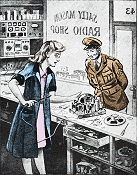 Sally Mason was the soldering iron-wielding
heroette (heroine sounds too much like the narcotic) of Nate Silverman's "Sally,
the Service Maid" series that ran in Radio-Craft magazine during the
years of World War II. As I noted in the previous episode, many of the nation's
women were left behind to run their husband's, father's and/or son's electronics
sales and repair businesses when they went off to save the world from aggressive
Communists, Socialists, Maoists, Nazis, and other nasty types. Some of those ladies
had already become very adept at troubleshooting, component replacement, and aligning
radio and television sets, while some were left to learn at the School of Hard Knocks.
Sally's father, Gus Mason... Sally Mason was the soldering iron-wielding
heroette (heroine sounds too much like the narcotic) of Nate Silverman's "Sally,
the Service Maid" series that ran in Radio-Craft magazine during the
years of World War II. As I noted in the previous episode, many of the nation's
women were left behind to run their husband's, father's and/or son's electronics
sales and repair businesses when they went off to save the world from aggressive
Communists, Socialists, Maoists, Nazis, and other nasty types. Some of those ladies
had already become very adept at troubleshooting, component replacement, and aligning
radio and television sets, while some were left to learn at the School of Hard Knocks.
Sally's father, Gus Mason...
 Crane Aerospace & Electronics' products
and services are organized into six integrated solutions: Cabin Systems, Electrical
Power Solutions, Fluid Management Solutions, Landing Systems, Microwave Solutions,
and Sensing Components & Systems. Our Microwave Solution designs and manufactures
high-performance
RF, IF and millimeter-wave components, subsystems and systems for commercial
aviation, defense, and space including linear & log amplifiers, fixed &
variable attenuators, circulators & isolators, power combiners & dividers,
couplers, mixers, switches & matrices, oscillators & synthesizers. Crane Aerospace & Electronics' products
and services are organized into six integrated solutions: Cabin Systems, Electrical
Power Solutions, Fluid Management Solutions, Landing Systems, Microwave Solutions,
and Sensing Components & Systems. Our Microwave Solution designs and manufactures
high-performance
RF, IF and millimeter-wave components, subsystems and systems for commercial
aviation, defense, and space including linear & log amplifiers, fixed &
variable attenuators, circulators & isolators, power combiners & dividers,
couplers, mixers, switches & matrices, oscillators & synthesizers.
Wednesday the 13th
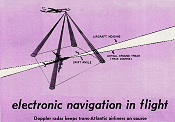 The AN/MPN-13|14 mobile radar system I worked
on while enlisted in the U.S. Air Force was designed and fielded around the time
this
Electronic Navigation in Flight article appeared in a 1962 issue of Radio-Electronics
magazine. It had been upgraded a few times by 1979 when I was in Air Traffic Control
Radar Repairman technical school at Keesler AFB, Mississippi; however, the original
system did not featured a Doppler capability. The fully RF analog system could not
provide air traffic controllers with speed data, but it did use physical mercury
delay lines to provide a stationary target (ground, and to some degree, rain, clutter)
cancellation by inverting and summing a real-time radar... The AN/MPN-13|14 mobile radar system I worked
on while enlisted in the U.S. Air Force was designed and fielded around the time
this
Electronic Navigation in Flight article appeared in a 1962 issue of Radio-Electronics
magazine. It had been upgraded a few times by 1979 when I was in Air Traffic Control
Radar Repairman technical school at Keesler AFB, Mississippi; however, the original
system did not featured a Doppler capability. The fully RF analog system could not
provide air traffic controllers with speed data, but it did use physical mercury
delay lines to provide a stationary target (ground, and to some degree, rain, clutter)
cancellation by inverting and summing a real-time radar...
 Decisions, decisions, decisions. As the
title states, color television manufacturers were, in 1965 when this Electronics
magazine article was published, finding themselves between a rock and a hard place,
as the saying goes, regarding a change
from vacuum tubes to transistors. The buying public (aka consumers) had mixed
emotions about the newfangled semiconductors based at least partly on bad information
about transistors. Transistors had been designed in various circuits for a decade
and a half and were gaining rapidly in performance and reliability. The price was
coming down, but as reported here, still cost $5 to $10 apiece compared to a $1
vacuum tube. Company management needed to decide whether to delay implementing the
new engineering and production methods required to deal with transistors... Decisions, decisions, decisions. As the
title states, color television manufacturers were, in 1965 when this Electronics
magazine article was published, finding themselves between a rock and a hard place,
as the saying goes, regarding a change
from vacuum tubes to transistors. The buying public (aka consumers) had mixed
emotions about the newfangled semiconductors based at least partly on bad information
about transistors. Transistors had been designed in various circuits for a decade
and a half and were gaining rapidly in performance and reliability. The price was
coming down, but as reported here, still cost $5 to $10 apiece compared to a $1
vacuum tube. Company management needed to decide whether to delay implementing the
new engineering and production methods required to deal with transistors...
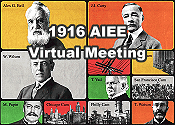 "At 8:30 p.m. on 16 May 1916, John J. Carty
banged his gavel at the Engineering Societies Building in New York City to call
to order a meeting of the American Institute of Electrical Engineers. This was no
ordinary gathering. The AIEE had decided to conduct a live national meeting connecting
more than 5,000 attendees in
eight cities across four time zones. More than a century before Zoom made virtual
meetings a pedestrian experience, telephone lines linked auditoriums from coast
to coast. AIEE members and guests in Atlanta, Boston, Chicago, Denver, New York,
Philadelphia, Salt Lake City, and San Francisco had telephone receivers at their
seats so they could listen..." "At 8:30 p.m. on 16 May 1916, John J. Carty
banged his gavel at the Engineering Societies Building in New York City to call
to order a meeting of the American Institute of Electrical Engineers. This was no
ordinary gathering. The AIEE had decided to conduct a live national meeting connecting
more than 5,000 attendees in
eight cities across four time zones. More than a century before Zoom made virtual
meetings a pedestrian experience, telephone lines linked auditoriums from coast
to coast. AIEE members and guests in Atlanta, Boston, Chicago, Denver, New York,
Philadelphia, Salt Lake City, and San Francisco had telephone receivers at their
seats so they could listen..."
 Finding information on the
Osgood Lens, invented by James R. Cravath, is challenging. For as prominent
as it was in magazines like The Saturday Evening Post in the late 1910s
and 1920s, there is not even a Wikipedia entry for the lens type or the man according
to my searches. Although not exactly the same as the Fresnel lenses used by lighthouses
since the 18th century, the concept is basically the same. Of course the Osgood
company was careful not to use the term Fresnel in their literature for potential
patent infringement reasons. Some vehicles might have been fitted with them as a
factory installed option, but they were also sold as add-on items. According to
the literature the tiered stack of prism-shaped glass directed the headlight beam
toward the road... Finding information on the
Osgood Lens, invented by James R. Cravath, is challenging. For as prominent
as it was in magazines like The Saturday Evening Post in the late 1910s
and 1920s, there is not even a Wikipedia entry for the lens type or the man according
to my searches. Although not exactly the same as the Fresnel lenses used by lighthouses
since the 18th century, the concept is basically the same. Of course the Osgood
company was careful not to use the term Fresnel in their literature for potential
patent infringement reasons. Some vehicles might have been fitted with them as a
factory installed option, but they were also sold as add-on items. According to
the literature the tiered stack of prism-shaped glass directed the headlight beam
toward the road...
 Werbel Microwave's Model
WM2PD-2-18-N is a wideband 2-way in-line power splitter covering the continuous
bandwidth of 2 to 18 GHz in a compact enclosure measuring 2.25 x 1.96 x 0.75 inches
with type N female connectors. The device is RoHS compliant. Return loss 18 dB
typical. Insertion loss 0.5 dB typical. Isolation 18 dB typical. Amplitude
balance 0.32 dB typical. Phase balance 4° typical... Werbel Microwave's Model
WM2PD-2-18-N is a wideband 2-way in-line power splitter covering the continuous
bandwidth of 2 to 18 GHz in a compact enclosure measuring 2.25 x 1.96 x 0.75 inches
with type N female connectors. The device is RoHS compliant. Return loss 18 dB
typical. Insertion loss 0.5 dB typical. Isolation 18 dB typical. Amplitude
balance 0.32 dB typical. Phase balance 4° typical...
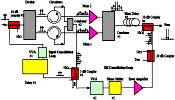 RF Cafe website visitor Ray Gutierrez generously
provided a paper for publication a few years ago, and now has provided a follow-on
article on the subject of intermodulation product cancellation in RF amplifiers.
Says Ray, "This paper is a continuation work for the "New
High Efficiency Intermodulation Cancellation Technique for Single Stage Amplifiers."
Published in January 2008 on RF Café's Paper section. The paper describes configurations
for dual and multiple parallel amplifiers and uses the basic Reflect Forward technique
for intermodulation cancellation. Some new improvements were made to the RFAL technique... RF Cafe website visitor Ray Gutierrez generously
provided a paper for publication a few years ago, and now has provided a follow-on
article on the subject of intermodulation product cancellation in RF amplifiers.
Says Ray, "This paper is a continuation work for the "New
High Efficiency Intermodulation Cancellation Technique for Single Stage Amplifiers."
Published in January 2008 on RF Café's Paper section. The paper describes configurations
for dual and multiple parallel amplifiers and uses the basic Reflect Forward technique
for intermodulation cancellation. Some new improvements were made to the RFAL technique...
Tuesday the 12th
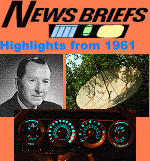 The January 1962 installment of Radio-Electronics
magazine's "News
Briefs" column begins with a wrap-up of the top stories from 1961. Included
is the record 55 new satellites launched that year by the U.S. To put that in perspective,
today, a rocket booster sometimes puts a couple dozen Starlink satellites into orbit
on a single launch. Closed-circuit TV monitors for private homes were coming online
- wired of course, not wireless. Today, wireless monitors are everywhere, and a
small fraction of the cost of the early types. Color TVs were becoming a more common
presence in households. In other news, audio loudspeaker innovator Peter Jensen
passed away. A scheme for providing TV broadcasting to homes via satellites in geosynchronous
orbit was in planning mode, which like Internet service, is ubiquitous... The January 1962 installment of Radio-Electronics
magazine's "News
Briefs" column begins with a wrap-up of the top stories from 1961. Included
is the record 55 new satellites launched that year by the U.S. To put that in perspective,
today, a rocket booster sometimes puts a couple dozen Starlink satellites into orbit
on a single launch. Closed-circuit TV monitors for private homes were coming online
- wired of course, not wireless. Today, wireless monitors are everywhere, and a
small fraction of the cost of the early types. Color TVs were becoming a more common
presence in households. In other news, audio loudspeaker innovator Peter Jensen
passed away. A scheme for providing TV broadcasting to homes via satellites in geosynchronous
orbit was in planning mode, which like Internet service, is ubiquitous...
 Even for those of us who were around when
the "old"
numerical prefixes became common parlance, it is difficult to remember having
ever used them. Although my introduction to terms using kilo, mega, milli, and micro
was not until about a decade after this 1962 Radio-Electronics magazine article
was published, I remember my electrical circuit instructor in high school using
the micromicro type prefixes, and some of the capacitors and inductors were marked
thusly. After nearly forgetting about the old designations, about 15 years ago I
began buying and reading these vintage... Even for those of us who were around when
the "old"
numerical prefixes became common parlance, it is difficult to remember having
ever used them. Although my introduction to terms using kilo, mega, milli, and micro
was not until about a decade after this 1962 Radio-Electronics magazine article
was published, I remember my electrical circuit instructor in high school using
the micromicro type prefixes, and some of the capacitors and inductors were marked
thusly. After nearly forgetting about the old designations, about 15 years ago I
began buying and reading these vintage...
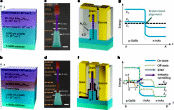 "Silicon
transistors, which are used to amplify and switch signals, are a critical component
in most electronic devices, from smartphones to automobiles. But silicon semiconductor
technology is held back by a fundamental physical limit that prevents transistors
from operating below a certain voltage. This limit, known as "Boltzmann
tyranny," hinders the energy efficiency of computers and other electronics,
especially with the rapid development of artificial intelligence technologies that
demand faster computation. In an effort to overcome this fundamental limit of silicon,
MIT researchers fabricated a different..." "Silicon
transistors, which are used to amplify and switch signals, are a critical component
in most electronic devices, from smartphones to automobiles. But silicon semiconductor
technology is held back by a fundamental physical limit that prevents transistors
from operating below a certain voltage. This limit, known as "Boltzmann
tyranny," hinders the energy efficiency of computers and other electronics,
especially with the rapid development of artificial intelligence technologies that
demand faster computation. In an effort to overcome this fundamental limit of silicon,
MIT researchers fabricated a different..."
 The Alien Property Custodian (APC), established
by the United States during World War I and later reinstated for World War II, played
a significant role in managing and seizing assets from enemy nations - particularly
Germany, Japan, and Italy - under the Trading with the Enemy Act of 1917. During
and after WWII, the APC was responsible for handling foreign-owned intellectual
properties, patents, and other assets in the U.S. that belonged to enemy nations,
to ensure that these properties would not benefit the Axis powers. Alien Property
Custodian and Patent Seizure Under the authority of the APC, the U.S. seized thousands
of patents from companies and individuals in Axis countries. This included groundbreaking
technologies in fields such as chemicals, pharmaceuticals, engineering... The Alien Property Custodian (APC), established
by the United States during World War I and later reinstated for World War II, played
a significant role in managing and seizing assets from enemy nations - particularly
Germany, Japan, and Italy - under the Trading with the Enemy Act of 1917. During
and after WWII, the APC was responsible for handling foreign-owned intellectual
properties, patents, and other assets in the U.S. that belonged to enemy nations,
to ensure that these properties would not benefit the Axis powers. Alien Property
Custodian and Patent Seizure Under the authority of the APC, the U.S. seized thousands
of patents from companies and individuals in Axis countries. This included groundbreaking
technologies in fields such as chemicals, pharmaceuticals, engineering...
 As with many relatively new technologies,
the exuberance over radio peaked quickly once the benefits of communications over
long distances without the need for wires was realized by the public. After a couple
decades a lot of "authorities" began pontificating about how all the useful applications
of radio waves had been discovered and that any new innovation would be merely incremental
improvements in existing technology. Novel circuits for minimizing static over the
radio or maybe building more powerful transmitters for longer range were the only
concepts within reach of their limited imaginations. This 1935 issue of Short
Wave Craft magazine reported on the beginnings of investigations into the use
of
radio waves for heating and treating food and other substances in a manner... As with many relatively new technologies,
the exuberance over radio peaked quickly once the benefits of communications over
long distances without the need for wires was realized by the public. After a couple
decades a lot of "authorities" began pontificating about how all the useful applications
of radio waves had been discovered and that any new innovation would be merely incremental
improvements in existing technology. Novel circuits for minimizing static over the
radio or maybe building more powerful transmitters for longer range were the only
concepts within reach of their limited imaginations. This 1935 issue of Short
Wave Craft magazine reported on the beginnings of investigations into the use
of
radio waves for heating and treating food and other substances in a manner...
Monday the 11th
 In researching the use of niobium's use
in superconducting magnets, as reported in this 1962 issue of Radio-Electronics
magazine, I learned that the element's original name was Columbium (symbol Cb).
Why "niobium," you might wonder? Its root is in Greek mythology, and concerns the
family of Tantalus (after whom the element tantalum is named). Niobium is today
used, amongst many other things, in the making of superconducting magnets, including
those in MRI machines. There is a glaring lack of safety equipment and precautions
here in this Bell Telephone Laboratories image of the scientists handling their
superconducting brew... In researching the use of niobium's use
in superconducting magnets, as reported in this 1962 issue of Radio-Electronics
magazine, I learned that the element's original name was Columbium (symbol Cb).
Why "niobium," you might wonder? Its root is in Greek mythology, and concerns the
family of Tantalus (after whom the element tantalum is named). Niobium is today
used, amongst many other things, in the making of superconducting magnets, including
those in MRI machines. There is a glaring lack of safety equipment and precautions
here in this Bell Telephone Laboratories image of the scientists handling their
superconducting brew...
 "Private investment in generative AI has
grown from about US $3B in 2022 to $25B in 2023, and about 80 percent of private
companies expect AI to drive their business in the next 3 years, according to Deloitte.
Keeping up with the latest advancements means upgrading GPUs, CPUs, and other electronic
equipment in data centers as newer, more advanced chips become available. And that,
researchers project, will lead to an explosion in the production of
electronic waste.. A study published
last week in the journal Nature Computational Science estimates that aggressive
adoption of large language models (LLMs) alone will generate 2.5M tons of e-waste
per year by 2030. 'AI doesn't exist in a vacuum; it relies on substantial hardware
resources..." "Private investment in generative AI has
grown from about US $3B in 2022 to $25B in 2023, and about 80 percent of private
companies expect AI to drive their business in the next 3 years, according to Deloitte.
Keeping up with the latest advancements means upgrading GPUs, CPUs, and other electronic
equipment in data centers as newer, more advanced chips become available. And that,
researchers project, will lead to an explosion in the production of
electronic waste.. A study published
last week in the journal Nature Computational Science estimates that aggressive
adoption of large language models (LLMs) alone will generate 2.5M tons of e-waste
per year by 2030. 'AI doesn't exist in a vacuum; it relies on substantial hardware
resources..."
 Hurry! Through the end of the year,
RIGOL is running a sale on their finest lines of Oscilloscopes and Spectrum
Analyzers. High-Resolution Oscilloscopes: Save up to 20% on DHO
Series 12-Bit Resolution Scopes and select options. Spectrum Analyzers:
Save up to 54% on select RF test equipment. Looking for other deals? Make sure to
visit our
Clearance page for deals on open-box, demo, and refurbished instruments... Hurry! Through the end of the year,
RIGOL is running a sale on their finest lines of Oscilloscopes and Spectrum
Analyzers. High-Resolution Oscilloscopes: Save up to 20% on DHO
Series 12-Bit Resolution Scopes and select options. Spectrum Analyzers:
Save up to 54% on select RF test equipment. Looking for other deals? Make sure to
visit our
Clearance page for deals on open-box, demo, and refurbished instruments...
 In his trademark style, electronics-themed
storyteller John T. Frye used his Mac's Service Shop venue to introduce readers
to another new development in the medical electronics field - the "ultrasonoscope."
It was the forerunner to modern sonogram machines. Relatively recent advances in
solid state electronics and signal processing techniques - albeit mostly analog
in nature - made design and construction of compact devices practical and affordable
by medical facilities. Unlike today where many doctor's offices have their own x-ray
and sonogram machines, it was still mostly hospitals... In his trademark style, electronics-themed
storyteller John T. Frye used his Mac's Service Shop venue to introduce readers
to another new development in the medical electronics field - the "ultrasonoscope."
It was the forerunner to modern sonogram machines. Relatively recent advances in
solid state electronics and signal processing techniques - albeit mostly analog
in nature - made design and construction of compact devices practical and affordable
by medical facilities. Unlike today where many doctor's offices have their own x-ray
and sonogram machines, it was still mostly hospitals...
  This
is my annual
Veterans
Day tribute. On November 11 (the 11th day of the 11th month), at 11:00 am (the
11th hour), we observe two minutes of silence in honor of countrymen who "gave
the last full measure of devotion." A Pittance of Time is performed
by Canadian citizen Terry Kelly (he went blind at
an early age). It was written after an experience he had in a store on Veterans
Day in 1999. The piece is done in the finest Celtic tradition. In regard to the
Communist and Fascist regimes where life and limb was sacrificed, have we thus far
won the battles, but lots the war? Look around you. This
is my annual
Veterans
Day tribute. On November 11 (the 11th day of the 11th month), at 11:00 am (the
11th hour), we observe two minutes of silence in honor of countrymen who "gave
the last full measure of devotion." A Pittance of Time is performed
by Canadian citizen Terry Kelly (he went blind at
an early age). It was written after an experience he had in a store on Veterans
Day in 1999. The piece is done in the finest Celtic tradition. In regard to the
Communist and Fascist regimes where life and limb was sacrificed, have we thus far
won the battles, but lots the war? Look around you.
Friday the 8th
 Amphenol's introduction of
Polyfoam® dielectric material for coaxial cable represented a big improvement
from both signal loss (attenuation) and velocity factor. This 1962 Radio-Electronics
magazine advertisement promoted its virtues. Its previous dielectric was solid polypropylene
having a dielectric constant of 2.26, whereas Polyfoam® claimed 1.50. Velocity factor
(VF) is proportional to the inverse square root of the dielectric constant (k);
i.e., VF = 1/√k. Hence VFpolypropylene = 0.620, and VFPolyfoam®=
0.816. The lower k value facilitates, for equivalent current handling, a smaller
coaxial cable diameter with a lower weight, and is more flexible due to a "softer"
dielectric. I could not find a breakdown voltage value for Polyfoam®, as compared
to polypropylene's 30 kv-40 kV. Calculation of the characteristic impedance
of a coaxial cable involves many parameters, all of which also affect... Amphenol's introduction of
Polyfoam® dielectric material for coaxial cable represented a big improvement
from both signal loss (attenuation) and velocity factor. This 1962 Radio-Electronics
magazine advertisement promoted its virtues. Its previous dielectric was solid polypropylene
having a dielectric constant of 2.26, whereas Polyfoam® claimed 1.50. Velocity factor
(VF) is proportional to the inverse square root of the dielectric constant (k);
i.e., VF = 1/√k. Hence VFpolypropylene = 0.620, and VFPolyfoam®=
0.816. The lower k value facilitates, for equivalent current handling, a smaller
coaxial cable diameter with a lower weight, and is more flexible due to a "softer"
dielectric. I could not find a breakdown voltage value for Polyfoam®, as compared
to polypropylene's 30 kv-40 kV. Calculation of the characteristic impedance
of a coaxial cable involves many parameters, all of which also affect...
 Popular comic strips (aka "funnies") in
the 1930s and 1940s featured numbskulls, ne'er-do-wells, and simpletons. There was
usually one character in the strip's cast that was smart - at least in a relative
way if not absolute. Being familiar with some of the old comics like Blondie, Barney
Google, Krazy Kat, Beetle Bailey, Gasoline Alley, etc., I can see a definite relationship
between the story line of "Entertaining
Uncle Oscar" and the comics of the era in this short story that appeared in
a 1939 edition of the ARRL's QST magazine. As you might guess, the feller
named "Ham" is the smart one. Popular comic strips (aka "funnies") in
the 1930s and 1940s featured numbskulls, ne'er-do-wells, and simpletons. There was
usually one character in the strip's cast that was smart - at least in a relative
way if not absolute. Being familiar with some of the old comics like Blondie, Barney
Google, Krazy Kat, Beetle Bailey, Gasoline Alley, etc., I can see a definite relationship
between the story line of "Entertaining
Uncle Oscar" and the comics of the era in this short story that appeared in
a 1939 edition of the ARRL's QST magazine. As you might guess, the feller
named "Ham" is the smart one.
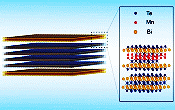 "Researchers have developed a new 'sandwich'
structure material that exhibits the quantum anomalous Hall effect,
enabling electrons to travel with almost no resistance at higher temperatures.
This breakthrough could significantly enhance computing power while dramatically
reducing energy consumption. The structure is based on a layered approach with bismuth
telluride and manganese bismuth telluride, promising faster and more efficient future
electronic devices. Quantum Material Innovations Scientists continually strive to
boost computer power while minimizing energy..." "Researchers have developed a new 'sandwich'
structure material that exhibits the quantum anomalous Hall effect,
enabling electrons to travel with almost no resistance at higher temperatures.
This breakthrough could significantly enhance computing power while dramatically
reducing energy consumption. The structure is based on a layered approach with bismuth
telluride and manganese bismuth telluride, promising faster and more efficient future
electronic devices. Quantum Material Innovations Scientists continually strive to
boost computer power while minimizing energy..."
• Electronics
Production Shows Decline
• IEEE Medal of
Honor Prize Increased to $2M
• WHO Says
Mobile Phones Not Linked to Brain Cancer
• Semiconductor Industry
Revamped with Hybrid Bonding
• Q2 Telecom Equipment
Revenues Slump 16%
 Electronics World magazine for
a while had a monthly feature titled "Radio &
Television News." It was a roundup of top news bits. This particular month's
collection had a lot of notable topics. On the heels of the Apollo 11 moon
landing, NASA informs people of the many benefits research and development on necessary
technologies that will redound to the commercial and consumer sectors. "Success
with on-board computers in spacecraft contributes directly to the day when home
computers take over hundreds of chores - from feeding the cat to reminding you of
appointments... - and maybe keep your checkbook... Electronics World magazine for
a while had a monthly feature titled "Radio &
Television News." It was a roundup of top news bits. This particular month's
collection had a lot of notable topics. On the heels of the Apollo 11 moon
landing, NASA informs people of the many benefits research and development on necessary
technologies that will redound to the commercial and consumer sectors. "Success
with on-board computers in spacecraft contributes directly to the day when home
computers take over hundreds of chores - from feeding the cat to reminding you of
appointments... - and maybe keep your checkbook...
Thursday the 7th
 These three
technology-themed comics appeared in the March 1962 issue of Radio-Electronics
magazine. Not everyone has access to the previous month's issue (February) to get
in on the implied gist of the page 57 comic. Since I own a copy, I looked it
up and can tell you the referred-to piece is from the Industrial Electronic Dictionary
entry for the month, concerning "From pulsation welding to register control." The
page 85 comic implies what to a certain degree is a non sequitur, since in
fact in the early days of television, before all households had AC line power service
(namely those in remote locations prior to the REA infrastructure build-out), some
sets had a DC power option. It wasn't until the 1950s that nearly all farms had
commercial power. Early Sears Roebuck catalogs had a large line of DC-power... These three
technology-themed comics appeared in the March 1962 issue of Radio-Electronics
magazine. Not everyone has access to the previous month's issue (February) to get
in on the implied gist of the page 57 comic. Since I own a copy, I looked it
up and can tell you the referred-to piece is from the Industrial Electronic Dictionary
entry for the month, concerning "From pulsation welding to register control." The
page 85 comic implies what to a certain degree is a non sequitur, since in
fact in the early days of television, before all households had AC line power service
(namely those in remote locations prior to the REA infrastructure build-out), some
sets had a DC power option. It wasn't until the 1950s that nearly all farms had
commercial power. Early Sears Roebuck catalogs had a large line of DC-power...
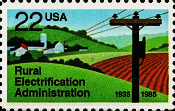 The
Rural Electrification Act (REA) of 1936 was a landmark piece of legislation
aimed at bringing electricity to rural areas across the United States, an effort
that transformed agricultural communities and elevated the quality of life for millions.
The REA was motivated by the stark contrast between urban and rural access to electricity
during the early 20th century. By the 1930s, nearly 90% of urban homes had electricity,
while only about 10% of rural homes enjoyed this amenity. This discrepancy hindered
agricultural productivity, as farms could not benefit from the conveniences and
efficiencies that electric power provided. It limited rural residents' access to
labor-saving devices and electric lights, which were... The
Rural Electrification Act (REA) of 1936 was a landmark piece of legislation
aimed at bringing electricity to rural areas across the United States, an effort
that transformed agricultural communities and elevated the quality of life for millions.
The REA was motivated by the stark contrast between urban and rural access to electricity
during the early 20th century. By the 1930s, nearly 90% of urban homes had electricity,
while only about 10% of rural homes enjoyed this amenity. This discrepancy hindered
agricultural productivity, as farms could not benefit from the conveniences and
efficiencies that electric power provided. It limited rural residents' access to
labor-saving devices and electric lights, which were...
 For some reason, a lot of people seem to
have a harder time grasping the concepts of magnetism than the concepts of electricity.
Maybe it is because most of the machines and appliances we are familiar with run
off of electricity supplied by the electric utility distribution system - not the
magnetism distribution system. The fact that motors, transformers, and relays, which
are present in one form or another in every household, office, and factory, are
as reliant upon magnetic effects as they are electrical effects is lost on the multitudes.
At the most fundamental level, electric and magnetic circuit equations exist that
are nearly the same, but with magnetism terms used rather than electricity terms;
i.e., duality. This "Speaking
of Magnetism" article in the monthly "After Class" section of the August 1958
issue of Popular Electronics magazine provides... For some reason, a lot of people seem to
have a harder time grasping the concepts of magnetism than the concepts of electricity.
Maybe it is because most of the machines and appliances we are familiar with run
off of electricity supplied by the electric utility distribution system - not the
magnetism distribution system. The fact that motors, transformers, and relays, which
are present in one form or another in every household, office, and factory, are
as reliant upon magnetic effects as they are electrical effects is lost on the multitudes.
At the most fundamental level, electric and magnetic circuit equations exist that
are nearly the same, but with magnetism terms used rather than electricity terms;
i.e., duality. This "Speaking
of Magnetism" article in the monthly "After Class" section of the August 1958
issue of Popular Electronics magazine provides...
 "Demand forecasting and anomaly detection
are AI capabilities that Google sees as accelerating numerous additional use cases.
A very material amount of all internet traffic, around 60% to 70%, runs through
the Google Global Network. In reaching that scale, the company has learned a lot
about using
AI tools to manage the network with a high degree of automation, according to
Naresh Rao, Google Cloud's head of telco analytics. And now, he said, CSPs are benefitting
from those same as they continue on their own network automation journeys. Rao said
use cases like demand forecasting, anomaly detection, root cause analysis and field
operations management 'have been..." "Demand forecasting and anomaly detection
are AI capabilities that Google sees as accelerating numerous additional use cases.
A very material amount of all internet traffic, around 60% to 70%, runs through
the Google Global Network. In reaching that scale, the company has learned a lot
about using
AI tools to manage the network with a high degree of automation, according to
Naresh Rao, Google Cloud's head of telco analytics. And now, he said, CSPs are benefitting
from those same as they continue on their own network automation journeys. Rao said
use cases like demand forecasting, anomaly detection, root cause analysis and field
operations management 'have been..."
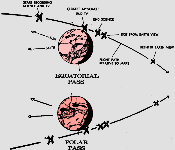 "Mariner"
was the project name given to NASA's first fleet of interplanetary spacecraft, headed
for both Venus (1, 2, 5, and 10) and Mars (3, 4, and 6 - 9). When Mariner 4
launched for Mars in 1964, it marked the first time mankind had successfully sent
a probe to "the red planet." It radioed back Mars surface images at a resolution
of 2 miles across. Fifteen missions later, we now have vehicles roving the Martian
landscape drilling holes for soil samples, crunching rocks, sniffing the air and
determining chemical compositions of the aforementioned, measuring temperature,
wind speed, atmospheric pressure, seismic events, and perhaps most importantly testing
for signs of life. Mariner 4's radio... "Mariner"
was the project name given to NASA's first fleet of interplanetary spacecraft, headed
for both Venus (1, 2, 5, and 10) and Mars (3, 4, and 6 - 9). When Mariner 4
launched for Mars in 1964, it marked the first time mankind had successfully sent
a probe to "the red planet." It radioed back Mars surface images at a resolution
of 2 miles across. Fifteen missions later, we now have vehicles roving the Martian
landscape drilling holes for soil samples, crunching rocks, sniffing the air and
determining chemical compositions of the aforementioned, measuring temperature,
wind speed, atmospheric pressure, seismic events, and perhaps most importantly testing
for signs of life. Mariner 4's radio...
Wednesday the 6th
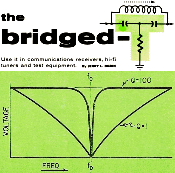 The
bridged-T filter is a quick-and-dirty construct used to notch out a specific
frequency that is interfering with a desirable frequency or band of frequencies.
It is a resonant LC (inductor-capacitor) circuit consisting of a single inductor
"bridging" a pair of series capacitors having a resistor to ground between them,
or, if preferred, a capacitor bridging one or two inductors. A convenient nomogram
(aka nomograph) is provided by the author in this 1964 Radio-Electronics
magazine article for quickly selecting values, which was a very popular design aid
in the pre-calculator era. A slide rule could be used to calculate a range of values
when only a single variable was in play, but juggling more than one variable (component
value) was greatly aided by a multivariable nomograph. Truth is nomographs can still... The
bridged-T filter is a quick-and-dirty construct used to notch out a specific
frequency that is interfering with a desirable frequency or band of frequencies.
It is a resonant LC (inductor-capacitor) circuit consisting of a single inductor
"bridging" a pair of series capacitors having a resistor to ground between them,
or, if preferred, a capacitor bridging one or two inductors. A convenient nomogram
(aka nomograph) is provided by the author in this 1964 Radio-Electronics
magazine article for quickly selecting values, which was a very popular design aid
in the pre-calculator era. A slide rule could be used to calculate a range of values
when only a single variable was in play, but juggling more than one variable (component
value) was greatly aided by a multivariable nomograph. Truth is nomographs can still...
 Television, in 1955, was still a relatively
new phenomenon to many - maybe even most - people. According to multiple sources,
the portion of American households with a TV set went from under 20% in 1950 to
nearly 90% ten years later in 1960. That was a meteoric rise, particularly considering
the expense of even a minimal TV. The technology was not even available commercially
when most people were born, so the rush to join in on the craze was akin to the
mass adoption of cellphones in the 1990s. "Carl &
Jerry" creator John Frye used his pair of electronics-savvy teenagers to help
make the "magic" behind recreating a moving picture on a CRT miles away from where
it was created. Water flowing through a garden hose has often been employed as an
analogy for current flowing through a wire to explain electricity to laymen and
beginning students of the craft. Here, it is not water flowing through the hose
but water leaving the hose and flowing through the air that serves to represent
an electron stream travelling from the electron gun to the phosphor-coated glass
front of a CRT. Frame rates, scan lines, deflection coils, and other relevant terms
are i Television, in 1955, was still a relatively
new phenomenon to many - maybe even most - people. According to multiple sources,
the portion of American households with a TV set went from under 20% in 1950 to
nearly 90% ten years later in 1960. That was a meteoric rise, particularly considering
the expense of even a minimal TV. The technology was not even available commercially
when most people were born, so the rush to join in on the craze was akin to the
mass adoption of cellphones in the 1990s. "Carl &
Jerry" creator John Frye used his pair of electronics-savvy teenagers to help
make the "magic" behind recreating a moving picture on a CRT miles away from where
it was created. Water flowing through a garden hose has often been employed as an
analogy for current flowing through a wire to explain electricity to laymen and
beginning students of the craft. Here, it is not water flowing through the hose
but water leaving the hose and flowing through the air that serves to represent
an electron stream travelling from the electron gun to the phosphor-coated glass
front of a CRT. Frame rates, scan lines, deflection coils, and other relevant terms
are i
 "The
RF front-end (RFFE) industry, valued at $21 billion, is expanding beyond its
traditional focus on mobile and infrastructure to drive innovation in the automotive
sector. Each segment within the industry presents unique dynamics and growth opportunities.
After a difficult 2022, the smartphone market is showing signs of recovery, with
expected year-over-year growth of 4%, projected to reach 1.2 billion units by 2024.
The mobile RFFE market is predicted to hit US$18 billion by the end of 2024, though
it may face stagnation due to market saturation and pricing pressures. This market
is expected to expand, with the 2027 launch of RedCap..." "The
RF front-end (RFFE) industry, valued at $21 billion, is expanding beyond its
traditional focus on mobile and infrastructure to drive innovation in the automotive
sector. Each segment within the industry presents unique dynamics and growth opportunities.
After a difficult 2022, the smartphone market is showing signs of recovery, with
expected year-over-year growth of 4%, projected to reach 1.2 billion units by 2024.
The mobile RFFE market is predicted to hit US$18 billion by the end of 2024, though
it may face stagnation due to market saturation and pricing pressures. This market
is expected to expand, with the 2027 launch of RedCap..."
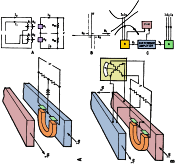 I'm having a hard time writing this with
my eyes rolled back in my head. The last time I experienced this level of overwhelmedness
was probably the third or fourth week of my feedback and control class at UVM. Even
though
electricity and magnetism shares many complimentary and parallel concepts, for
some reason thinking in terms of magnetics when describing amplifiers, mixers, modulators,
etc., has always caused brain freeze. Maybe it has to do with an ingrained bias
due to my earliest dealings with circuits being from a technician background before
earning an engineering degree. The equations of electric fields and magnetic fields
are very similar so that helps lower... I'm having a hard time writing this with
my eyes rolled back in my head. The last time I experienced this level of overwhelmedness
was probably the third or fourth week of my feedback and control class at UVM. Even
though
electricity and magnetism shares many complimentary and parallel concepts, for
some reason thinking in terms of magnetics when describing amplifiers, mixers, modulators,
etc., has always caused brain freeze. Maybe it has to do with an ingrained bias
due to my earliest dealings with circuits being from a technician background before
earning an engineering degree. The equations of electric fields and magnetic fields
are very similar so that helps lower...
 Temwell is a manufacturer of 5G wireless communications filters
for aerospace, satellite communication, AIoT, 5G networking, IoV, drone, mining
transmission, IoT, medical, military, laboratory, transportation, energy, broadcasting
(CATV), and etc. An RF helical bandpass specialist since 1994, we have posted >5,000
completed spec sheets online for all kinds of RF filters including helical, cavity,
LC, and SMD. Standard highpass, lowpass, bandpass, and bandstop, as well as duplexer/diplexer,
multiplexer. Also RF combiners, splitters, power dividers, attenuators, circulators,
couplers, PA, LNA, and obsolete coil & inductor solutions. Temwell is a manufacturer of 5G wireless communications filters
for aerospace, satellite communication, AIoT, 5G networking, IoV, drone, mining
transmission, IoT, medical, military, laboratory, transportation, energy, broadcasting
(CATV), and etc. An RF helical bandpass specialist since 1994, we have posted >5,000
completed spec sheets online for all kinds of RF filters including helical, cavity,
LC, and SMD. Standard highpass, lowpass, bandpass, and bandstop, as well as duplexer/diplexer,
multiplexer. Also RF combiners, splitters, power dividers, attenuators, circulators,
couplers, PA, LNA, and obsolete coil & inductor solutions.
Tuesday the 5th
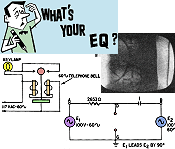 Here we are with another set of three "What's
Your EQ?" circuit challenges, these from the February 1962 issue of Radio-Electronics
magazine. As usual, those challenges provided by Jack Darr are the purview of television
servicemen of the era. The photo shown of the problematic CRT display looks like
a chest x-ray or maybe hieroglyphics in the dark corner of a cave, but evidently
the artifacts are readily identifiable to an initiated few. The Forbidden Current
Path circuit answer is not what I thought it would be. I maintain that whether my
answer or the designer's answer is correct depends on the physical... Here we are with another set of three "What's
Your EQ?" circuit challenges, these from the February 1962 issue of Radio-Electronics
magazine. As usual, those challenges provided by Jack Darr are the purview of television
servicemen of the era. The photo shown of the problematic CRT display looks like
a chest x-ray or maybe hieroglyphics in the dark corner of a cave, but evidently
the artifacts are readily identifiable to an initiated few. The Forbidden Current
Path circuit answer is not what I thought it would be. I maintain that whether my
answer or the designer's answer is correct depends on the physical...
 "A new
world record
in wireless transmission, promising faster and more reliable wireless communications,
has been set by researchers from UCL. The team successfully sent data over the air
at a speed of 938 Gb/s over a record frequency range of 5–150 GHz. This speed
is up to 9,380 times faster than the best average 5G download speed in the UK, which
is currently 100 Mb/s or over. The total bandwidth of 145 GHz is more
than five times higher than the previous wireless transmission world record. Typically,
wireless networks transmit information using radio waves over a narrow range of
frequencies..." "A new
world record
in wireless transmission, promising faster and more reliable wireless communications,
has been set by researchers from UCL. The team successfully sent data over the air
at a speed of 938 Gb/s over a record frequency range of 5–150 GHz. This speed
is up to 9,380 times faster than the best average 5G download speed in the UK, which
is currently 100 Mb/s or over. The total bandwidth of 145 GHz is more
than five times higher than the previous wireless transmission world record. Typically,
wireless networks transmit information using radio waves over a narrow range of
frequencies..."
 Sputnik refers to the first series of satellites
launched by the Soviet Union. The word "Sputnik" means "satellite" in Russian. The
launch of Sputnik 1 on October 4, 1957, marked a monumental moment in human history,
heralding the dawn of the Space Age and sparking a fierce technological competition
known as the Space Race between the United States and the Soviet Union. This satellite,
the world's first artificial one, orbited Earth at an altitude of roughly 215 to
939 kilometers and broadcast a radio signal that astonished the world, particularly
in the United States, where it spurred rapid advancements in aerospace and scientific
research. The successful launch of Sputnik was an achievement that was years in
the making, involving a combination of visionary planning, political motives, and
intensive engineering by some of the Soviet Union's top scientists. Sputnik refers to the first series of satellites
launched by the Soviet Union. The word "Sputnik" means "satellite" in Russian. The
launch of Sputnik 1 on October 4, 1957, marked a monumental moment in human history,
heralding the dawn of the Space Age and sparking a fierce technological competition
known as the Space Race between the United States and the Soviet Union. This satellite,
the world's first artificial one, orbited Earth at an altitude of roughly 215 to
939 kilometers and broadcast a radio signal that astonished the world, particularly
in the United States, where it spurred rapid advancements in aerospace and scientific
research. The successful launch of Sputnik was an achievement that was years in
the making, involving a combination of visionary planning, political motives, and
intensive engineering by some of the Soviet Union's top scientists.
Blog: Air Quality
Measurements with Particle Counters
 Transcat | Axiom Test Equipment, an electronic
test equipment rental and sales company has published a new blog post titled "Provide
Essential Air Quality Measurements with These Particle Counters" that covers
how particle counters can provide essential measurement capabilities that can help
avoid contamination and support high manufacturing yields. These measurement tools
can detect and measure microscopic particles suspended in air that can contaminate
the most carefully planned manufacturing lines. Air particle counters can be designed
for various... Transcat | Axiom Test Equipment, an electronic
test equipment rental and sales company has published a new blog post titled "Provide
Essential Air Quality Measurements with These Particle Counters" that covers
how particle counters can provide essential measurement capabilities that can help
avoid contamination and support high manufacturing yields. These measurement tools
can detect and measure microscopic particles suspended in air that can contaminate
the most carefully planned manufacturing lines. Air particle counters can be designed
for various...
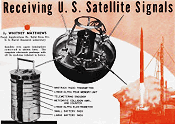 In 1958, most people were not accustomed
to seeing the now-familiar maps plotting
sinusoidal courses of satellites across the face of the earth. It had only been
in October of the previous year that any object other than the moon was in orbit
around our home planet - that was U.S.S.R.'s Sputnik. Just as people of all ages
and all backgrounds enthusiastically joined in the newfangled phenomenon of aeroplanes
after the Wright Brothers flew their fragile craft at Kitty Hawk, electronics communications
and scientists worldwide hopped aboard the satellite train. This article from a
1958 issue of Radio & TV News magazine provided insight into the construction
and flight characteristics... In 1958, most people were not accustomed
to seeing the now-familiar maps plotting
sinusoidal courses of satellites across the face of the earth. It had only been
in October of the previous year that any object other than the moon was in orbit
around our home planet - that was U.S.S.R.'s Sputnik. Just as people of all ages
and all backgrounds enthusiastically joined in the newfangled phenomenon of aeroplanes
after the Wright Brothers flew their fragile craft at Kitty Hawk, electronics communications
and scientists worldwide hopped aboard the satellite train. This article from a
1958 issue of Radio & TV News magazine provided insight into the construction
and flight characteristics...
 LadyBug Technologies was founded in 2004
by two microwave engineers with a passion for quality microwave test instrumentation.
Our employees offer many years experience in the design and manufacture of the worlds
best vector network analyzers, spectrum analyzers, power meters and associated components.
The management team has additional experience in optical power testing, military
radar and a variety of programming environments including LabVIEW, VEE and other
languages often used in programmatic systems. Extensive experience in a broad spectrum
of demanding measurement applications. You can be assured that our Power Sensors
are designed, built, tested and calibrated without compromise. LadyBug Technologies was founded in 2004
by two microwave engineers with a passion for quality microwave test instrumentation.
Our employees offer many years experience in the design and manufacture of the worlds
best vector network analyzers, spectrum analyzers, power meters and associated components.
The management team has additional experience in optical power testing, military
radar and a variety of programming environments including LabVIEW, VEE and other
languages often used in programmatic systems. Extensive experience in a broad spectrum
of demanding measurement applications. You can be assured that our Power Sensors
are designed, built, tested and calibrated without compromise.
Monday the 4th
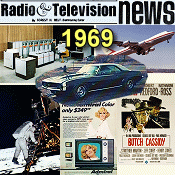 What were some of the
top issues of the radio and television industry half a century ago? In a lot
of respects, the same things that concern it today. A ready supply of service technicians
was a concern that was taken seriously by the Electronics Industry Association (EIA).
While there are not many local repair shops for electronics products nowadays, there
is still a huge demand to techs who are willing and able to do the hard work of
keeping the world's communication infrastructure operational - climbing towers,
repairing cell equipment. Now, as then, good pay, job security, benefits, and respect
for the job being done were at the top of... What were some of the
top issues of the radio and television industry half a century ago? In a lot
of respects, the same things that concern it today. A ready supply of service technicians
was a concern that was taken seriously by the Electronics Industry Association (EIA).
While there are not many local repair shops for electronics products nowadays, there
is still a huge demand to techs who are willing and able to do the hard work of
keeping the world's communication infrastructure operational - climbing towers,
repairing cell equipment. Now, as then, good pay, job security, benefits, and respect
for the job being done were at the top of...
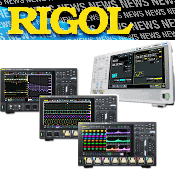 In a parallel to the traditional test setup
of signal generation and signal acquisition, RIGOL Technologies announced today
the latest additions to its portfolio of
performance measurement equipment with the introduction of the DG5000 Pro Series
Generators and DHO/MHO5000 Series Oscilloscopes. The DHO/MHO5000 Series bring next-level
performance to RIGOL's respected line of high-resolution oscilloscopes, while the
DG5000 Pro generators do the same for the company's capable Pro Series arbitrary
waveform generators... In a parallel to the traditional test setup
of signal generation and signal acquisition, RIGOL Technologies announced today
the latest additions to its portfolio of
performance measurement equipment with the introduction of the DG5000 Pro Series
Generators and DHO/MHO5000 Series Oscilloscopes. The DHO/MHO5000 Series bring next-level
performance to RIGOL's respected line of high-resolution oscilloscopes, while the
DG5000 Pro generators do the same for the company's capable Pro Series arbitrary
waveform generators...
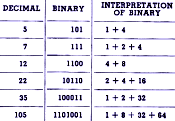 When selecting articles for posting here
on RF Cafe, I like to include ones that are directed toward newcomers to the field
of electronics as well as for seasoned veterans. This piece from a 1958 issue of
Radio & TV News magazine titled "Basic Electronic Counting," is a
prime example in that it introduces the concept of binary numbers. We've all been
there at some point in our careers. A big difference between now and when this article
appeared is that in 1958, almost nobody was familiar to binary numbers, and fuggetabout
[sic] octal and hexadecimal. Only those relatively few people designing and working
with multimillion dollar, vacuum tube-based digital computers installed in universities,
megacorporations, and government research facilities had ever dealt with digital
numbers. The earliest example of powers of two I remember was back in junior high
school. It had to do with a When selecting articles for posting here
on RF Cafe, I like to include ones that are directed toward newcomers to the field
of electronics as well as for seasoned veterans. This piece from a 1958 issue of
Radio & TV News magazine titled "Basic Electronic Counting," is a
prime example in that it introduces the concept of binary numbers. We've all been
there at some point in our careers. A big difference between now and when this article
appeared is that in 1958, almost nobody was familiar to binary numbers, and fuggetabout
[sic] octal and hexadecimal. Only those relatively few people designing and working
with multimillion dollar, vacuum tube-based digital computers installed in universities,
megacorporations, and government research facilities had ever dealt with digital
numbers. The earliest example of powers of two I remember was back in junior high
school. It had to do with a
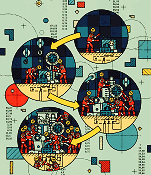 "Every invention begins with a problem -
and the creative act of seeing a problem where others might just see unchangeable
reality. For one 5-year-old, the problem was simple: She liked to have her tummy
rubbed as she fell asleep. But her mom, exhausted from working two jobs, often fell
asleep herself while putting her daughter to bed. 'So [the girl] invented a teddy
bear that would rub her belly for her,' explains Stephanie Couch, executive director
of the Lemelson MIT Program. Its mission is to nurture the
next generation of inventors
and entrepreneurs. Anyone can learn to be an inventor, Couch says, given the right
resources and encouragement. 'Invention doesn't come from some innate genius, it's
not something that only really..." "Every invention begins with a problem -
and the creative act of seeing a problem where others might just see unchangeable
reality. For one 5-year-old, the problem was simple: She liked to have her tummy
rubbed as she fell asleep. But her mom, exhausted from working two jobs, often fell
asleep herself while putting her daughter to bed. 'So [the girl] invented a teddy
bear that would rub her belly for her,' explains Stephanie Couch, executive director
of the Lemelson MIT Program. Its mission is to nurture the
next generation of inventors
and entrepreneurs. Anyone can learn to be an inventor, Couch says, given the right
resources and encouragement. 'Invention doesn't come from some innate genius, it's
not something that only really..."
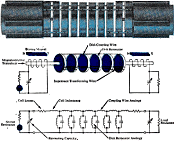 Mechanical filters of the type described
in this 1969 Electronics World magazine article are yet another example
of the genius of some people. They are actually a form of electromechanical device
in that the applied electrical signals are first converted into mechanical signals,
followed by resonant mechanical elements that discriminate according to frequency,
and finally a conversion back to an electrical signal is made. It is fundamentally
the same principal as a crystal, SAW, or BAW filter, albeit each with distinctly
different methods and topologies. Mr. Donovan Southworth, of Collins Radio, presents
the basics of mechanical filters in this brief write-up... Mechanical filters of the type described
in this 1969 Electronics World magazine article are yet another example
of the genius of some people. They are actually a form of electromechanical device
in that the applied electrical signals are first converted into mechanical signals,
followed by resonant mechanical elements that discriminate according to frequency,
and finally a conversion back to an electrical signal is made. It is fundamentally
the same principal as a crystal, SAW, or BAW filter, albeit each with distinctly
different methods and topologies. Mr. Donovan Southworth, of Collins Radio, presents
the basics of mechanical filters in this brief write-up...
 LadyBug Technologies was founded in 2004
by two microwave engineers with a passion for quality microwave test instrumentation.
Our employees offer many years experience in the design and manufacture of the worlds
best vector network analyzers, spectrum analyzers, power meters and associated components.
The management team has additional experience in optical power testing, military
radar and a variety of programming environments including LabVIEW, VEE and other
languages often used in programmatic systems. Extensive experience in a broad spectrum
of demanding measurement applications. You can be assured that our Power Sensors
are designed, built, tested and calibrated without compromise. LadyBug Technologies was founded in 2004
by two microwave engineers with a passion for quality microwave test instrumentation.
Our employees offer many years experience in the design and manufacture of the worlds
best vector network analyzers, spectrum analyzers, power meters and associated components.
The management team has additional experience in optical power testing, military
radar and a variety of programming environments including LabVIEW, VEE and other
languages often used in programmatic systems. Extensive experience in a broad spectrum
of demanding measurement applications. You can be assured that our Power Sensors
are designed, built, tested and calibrated without compromise.
Friday the 1st
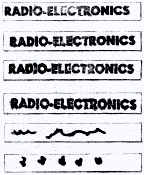 Attempts at making an
electronically printed facsimile (fax) of an original document at a location
distant from the source have been around for quite a while. As mentioned by
Radio-Electronics magazine editor Hugo Gernsback in this article, Samuel Morse
had a crude working device for printing messages on paper even before his eponymously
named code of dots and dashes became famous in 1837. A couple decades earlier, a
fellow named John Redman Coxe, of Philadelphia, Pennsylvania, devised a method of
electronically printing images and text on paper using a conductive solution and
a direct current pile (aka battery). Dr. Coxe, a physician, is not a well-known
figure in the electronics world, but in his day... Attempts at making an
electronically printed facsimile (fax) of an original document at a location
distant from the source have been around for quite a while. As mentioned by
Radio-Electronics magazine editor Hugo Gernsback in this article, Samuel Morse
had a crude working device for printing messages on paper even before his eponymously
named code of dots and dashes became famous in 1837. A couple decades earlier, a
fellow named John Redman Coxe, of Philadelphia, Pennsylvania, devised a method of
electronically printing images and text on paper using a conductive solution and
a direct current pile (aka battery). Dr. Coxe, a physician, is not a well-known
figure in the electronics world, but in his day...
 "Researchers have discovered how the 'edge
of chaos' can help electronic chips overcome signal losses, making chips simpler
and more efficient. By using a metallic wire on a semi-stable material, this method
allows for long metal lines to act like superconductors and amplify signals, potentially
transforming chip design by eliminating the need for transistor amplifiers and reducing
power usage. A stubbed toe immediately sends pain signals to the brain through several
meters of axons, which are composed of highly resistive fleshy material. These axons
operate using a principle known as the 'edge of chaos,' or semi-stability, enabling
the swift and precise transmission of information..." "Researchers have discovered how the 'edge
of chaos' can help electronic chips overcome signal losses, making chips simpler
and more efficient. By using a metallic wire on a semi-stable material, this method
allows for long metal lines to act like superconductors and amplify signals, potentially
transforming chip design by eliminating the need for transistor amplifiers and reducing
power usage. A stubbed toe immediately sends pain signals to the brain through several
meters of axons, which are composed of highly resistive fleshy material. These axons
operate using a principle known as the 'edge of chaos,' or semi-stability, enabling
the swift and precise transmission of information..."
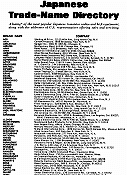 The January 1969 issue of Electronics
World magazine published an extensive list of
Japanese company trade names and their addresses. Many of them went out of business
or were bought by other corporations long ago, as occurs in all countries. "Aiwa"
is listed twice, but that might have been a legitimate duplication due to separate
locations (BTW, I owned an Aiwa stereo at one time). My first "real" cassette tape
deck was made by TEAC (founded in 1953 as the Tokyo Electro Acoustic Company) and
my first "real" stereo receiver was made by Sansui. I remember the line in "Back
to the Future 3" where Doc Brown, having time-travelled from 1955, makes a
disparaging remark about a circuit in the DeLorean failing because of it being labeled
"Made in Japan." Marty counters... The January 1969 issue of Electronics
World magazine published an extensive list of
Japanese company trade names and their addresses. Many of them went out of business
or were bought by other corporations long ago, as occurs in all countries. "Aiwa"
is listed twice, but that might have been a legitimate duplication due to separate
locations (BTW, I owned an Aiwa stereo at one time). My first "real" cassette tape
deck was made by TEAC (founded in 1953 as the Tokyo Electro Acoustic Company) and
my first "real" stereo receiver was made by Sansui. I remember the line in "Back
to the Future 3" where Doc Brown, having time-travelled from 1955, makes a
disparaging remark about a circuit in the DeLorean failing because of it being labeled
"Made in Japan." Marty counters...
• ARRL Defends
902-928 MHz Amateur Radio Band
• FCC's
Auto Safety Spectrum Rules
• $5M in U.S.
Chips Act Money to Metrology Projects
• U.S. State Department Approves
Surveillance Radar System Sale to Romania
•
5G Americas ITU IMT-2030 Vision for 6G White Paper
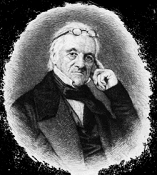 John Redman Coxe was a prominent American
physician, scientist, and innovator born on September 20, 1773, in Philadelphia.
Coxe's intellect and curiosity drove him toward an illustrious career in both medicine
and early scientific exploration, which included experimentation in electrochemistry.
He graduated with a degree in medicine in 1794, setting the course for his lifelong
journey into medicine and early scientific innovation. Coxe broadened his approach
to medicine and science, inspiring him to explore the convergence of scientific
methods and practical applications. John Redman Coxe is most remembered not only
for his contributions to medicine but also for his interest in experimental physics,
particularly in the field of electrochemistry... John Redman Coxe was a prominent American
physician, scientist, and innovator born on September 20, 1773, in Philadelphia.
Coxe's intellect and curiosity drove him toward an illustrious career in both medicine
and early scientific exploration, which included experimentation in electrochemistry.
He graduated with a degree in medicine in 1794, setting the course for his lifelong
journey into medicine and early scientific innovation. Coxe broadened his approach
to medicine and science, inspiring him to explore the convergence of scientific
methods and practical applications. John Redman Coxe is most remembered not only
for his contributions to medicine but also for his interest in experimental physics,
particularly in the field of electrochemistry...
 TotalTemp Technologies has more than 40
years of combined experience providing thermal platforms.
Thermal Platforms are
available to provide temperatures between -100°C and +200°C for cryogenic cooling,
recirculating & circulating coolers, temperature chambers and temperature controllers,
thermal range safety controllers, space simulation chambers, hybrid benchtop chambers,
custom systems and platforms. Manual and automated configurations for laboratory
and production environments. Please contact TotalTemp Technologies today to learn
how they can help your project. TotalTemp Technologies has more than 40
years of combined experience providing thermal platforms.
Thermal Platforms are
available to provide temperatures between -100°C and +200°C for cryogenic cooling,
recirculating & circulating coolers, temperature chambers and temperature controllers,
thermal range safety controllers, space simulation chambers, hybrid benchtop chambers,
custom systems and platforms. Manual and automated configurations for laboratory
and production environments. Please contact TotalTemp Technologies today to learn
how they can help your project.
These archive pages are provided in order to make it easier for you to find items
that you remember seeing on the RF Cafe homepage. Of course probably the easiest
way to find anything on the website is to use the "Search
RF Cafe" box at the top of every page. Some quoted items have been shortened
to save space. About RF Cafe.
Homepage Archive Pages
2026:
Jan |
Feb | Mar | Apr | May | Jun | Jul | Aug
| Sep | Oct | Nov | Dec
2025:
Jan |
Feb |
Mar |
Apr |
May |
Jun |
Jul |
Aug |
Sep |
Oct |
Nov |
Dec
2024:
Jan |
Feb |
Mar |
Apr |
May |
Jun |
Jul |
Aug |
Sep |
Oct |
Nov |
Dec
2023:
Jan |
Feb |
Mar |
Apr |
May |
Jun |
Jul |
Aug |
Sep |
Oct |
Nov |
Dec
2022:
Jan |
Feb |
Mar |
Apr |
May |
Jun |
Jul |
Aug |
Sep |
Oct |
Nov |
Dec
2021:
Jan |
Feb |
Mar |
Apr |
May |
Jun |
Jul |
Aug |
Sep |
Oct |
Nov |
Dec
2020:
Jan |
Feb |
Mar |
Apr |
May |
Jun |
Jul |
Aug |
Sep |
Oct |
Nov |
Dec
2019:
Jan |
Feb |
Mar |
Apr |
May |
Jun |
Jul |
Aug |
Sep |
Oct |
Nov |
Dec
2018:
Jan |
Feb |
Mar |
Apr |
May |
Jun |
Jul |
Aug |
Sep |
Oct |
Nov |
Dec
2017:
Jan | Feb |
Mar |
Apr |
May |
Jun |
Jul |
Aug |
Sep |
Oct |
Nov |
Dec
2016:
Jan | Feb |
Mar |
Apr |
May |
Jun |
Jul |
Aug |
Sep |
Oct |
Nov |
Dec
2015:
Jan | Feb |
Mar |
Apr |
May |
Jun |
Jul |
Aug | Sep |
Oct |
Nov |
Dec
2014:
Jan | Feb |
Mar |
Apr |
May |
Jun |
Jul |
Aug |
Sep |
Oct |
Nov |
Dec
2013:
Jan | Feb |
Mar |
Apr |
May |
Jun |
Jul |
Aug |
Sep |
Oct |
Nov |
Dec
2012: 1 |
2 | 3
| 4 | 5
| 6 | 7
| 8 | 9
| 10 | 11
| 12 | 13
(no archives before 2012)
- Christmas-themed
items
|



















 The Alien Property Custodian (APC)
The Alien Property Custodian (APC)






















 Sputnik
Sputnik

 LadyBug Technologies
LadyBug Technologies



 Mechanical filters
Mechanical filters


 John Redman Coxe
John Redman Coxe



